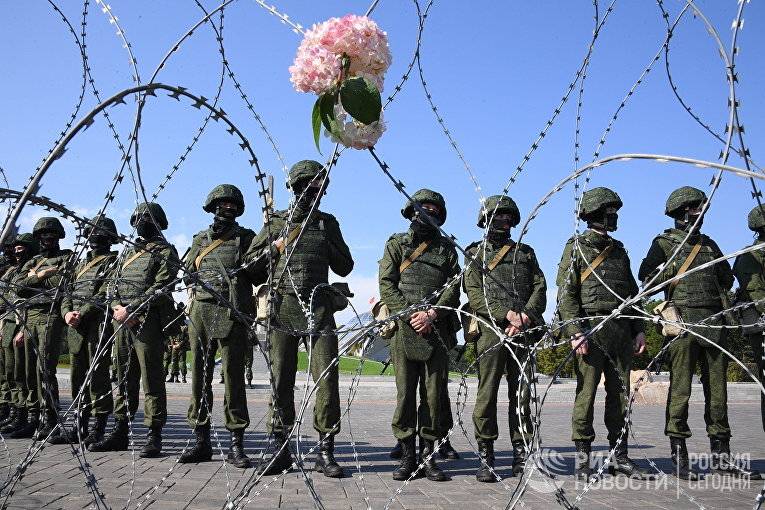Washington Examiner USA
by Janusz Bugajski
In trying to preserve his power, Belarusian President Alexander Lukashenko could provoke a direct confrontation between NATO and Russia. A dangerous scenario will unfold if he refuses to hold new elections and mass protests against election fraud continue to rock his country.
Having already requested direct assistance from Moscow, a Russian military or paramilitary intervention would place NATO forces on high alert along Belarus’s western borders. If Lukashenko fails to pacify public outrage and the country grinds to a standstill, the Kremlin may calculate that a more direct intervention is necessary to prevent democratization and closer links between Belarus and the West.
Russian President Vladimir Putin has disclosed that a special reserve force is already poised to enter the country to fulfill treaty obligations for Belarus’s security. Both Lukashenko and Putin are pushing the propaganda line that hostile outside powers, led by the United States and Poland, have organized the public protests with the aim of tearing Belarus away from Russia and partitioning its territory.
Lukashenko has focused attention on the Grodno region in northwest Belarus, which borders Poland and Lithuania and is inhabited by over 200,000 members of the Polish minority, as an alleged target of Western subversion. A pretext can be manufactured to justify the use of force, whether it be a staged ethnic incident involving members of the Polish minority or a bombing blamed on saboteurs. Any ensuing Russian intervention would be a demonstration that Moscow is protecting Belarus from a NATO invasion. A crackdown in the region against the Polish population would spark a strong reaction from Warsaw in response and could push the government to place its own military on high alert.
A methodology has already been developed in Moscow to defeat an invading NATO force and was on display during the Russian-Belarusian Zapad military exercises in 2017. In this fictional scenario, Russian and Belarusian troops overturned the fictional state of Veishnoria, carved out of northwestern Belarus. According to Kremlin planners, such a conflict could escalate into a full-scale war with NATO.
Lukashenko has reportedly reached an agreement with Putin to unite their troops in the event of a direct threat from the West. Russian forces have also been intensifying their combat preparations in the militarized Russian exclave of Kaliningrad, bordering Poland and Lithuania. As if to bait Poland into a confrontation, Lukashenko ordered half of the country’s army to prepare for combat and deployed several units for exercises along the western border where claims of a NATO buildup have been disproved. Poland’s Prime Minister Mateusz Morawiecki asserted that Putin was using the camouflage of restoring control in Belarus in order to hide Russia’s hostile breach of international law.
Lukashenko is particularly angered by the imposition of new EU economic sanctions against Belarus and has threatened to retaliate against Poland and Lithuania, which spearheaded the effort in response to the election fraud and subsequent violence. Lithuania also hosted the evident election victor, Svetlana Tikhanovskaya, who was pressured into exile by Belarusian authorities. Lukashenko said Belarus would strike back by halting imports from Lithuania and force its western neighbors to use longer routes in their trade with Russia and China.
Warsaw and Vilnius will also be closely watching how Russia may use Belarus as a crisis of opportunity to more closely integrate the two states politically, economically, and militarily, a policy that Lukashenko resisted when he was in a stronger political position. Moscow is likely to push for the construction of permanent military bases in Belarus close to NATO borders, including an air base in the Grodno region that would host Russian Su-27 fighter jets.
Such developments will be seen as a challenge to the sovereignty and security of Poland and Lithuania. In particular, it would threaten the Suwalki corridor, a narrow stretch of land between Poland and Lithuania that separates Belarus from Russia’s Kaliningrad. If severed by Russian forces, this would prevent NATO assistance from reaching the three Baltic countries in the event of conflict. Any permanent presence of the Russian military in Belarus would also challenge Ukraine’s security along its northern border.
Kyiv is already facing a buildup of Russian forces along its eastern border and southern coastline, as Moscow seeks to paralyze Ukraine’s independence. As the Belarus crisis unfolds, potential conflict points will multiply across the region.
Janusz Bugajski is a senior fellow at the Center for European Policy Analysis in Washington, D.C. His recent book, co-authored with Margarita Assenova, is entitled Eurasian Disunion: Russia’s Vulnerable Flanks.
